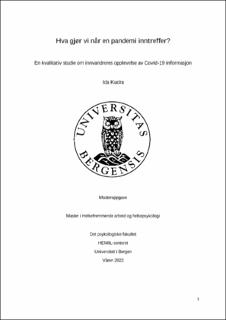Hva gjør vi når en pandemi inntreffer?: En kvalitativ studie om innvandrers opplevelse av Covid-19 informasjon
Master thesis
Permanent lenke
https://hdl.handle.net/11250/2998970Utgivelsesdato
2022-05-19Metadata
Vis full innførselSamlinger
- Master theses [162]
Sammendrag
Sammendrag Bakgrunn: Covid-19 pandemien resulterte i et økt behov for beskyttelse, og derav var behovet for tilgjengelig og kvalitetssiker informasjon av stor betydning. Forskning viste at enkelte med innvandrerbakgrunn har vært særlig utsatt for smitte, og at noen mennesker med innvandrerbakgrunn var overrepresentert i smittestatistikken. Hensikt: Å undersøke hvordan innvandrere i en kommune på Vestlandet har opplevd og oppfattet informasjon relatet til Covid-19 i lys av teori om salutogenese og helsekompetanse. Problemstillinger: 1. Hvordan har innvandrere i en kommune på Vestlandet opplevd informasjon relatert til Covid-19? og 2. Hvordan har innvandrere i en kommune på Vestlandet anvendt sin helsekompetanse under Covid-19 pandemien? Metode: Denne studien hadde et kvalitativt forskningsdesign, og var inspirert av fenomenologi og hermeneutikk. Det ble gjennomført intervju med åtte innvandrere i alderen 25-44 år. Datamaterialet, som kom fram gjennom intervjuene, ble analysert ved bruk av tematisk nettverksanalyse. Funn: Deltakerne holdt seg oppdatert om Covid-19 ved å anvende ulike informasjonskilder og -kanaler. De opplevde imidlertid at oversatt informasjon om Covid-19 var forsinket og forenklet, sammenlignet med samme informasjon gitt på norsk. Fravær av informasjon tilpasset deltakernes kulturelle og økonomiske kontekst vanskeliggjorde anvendelse av smitteverntiltak. Støtte fra nettverk bidro til bedre håndtering av pandemien. Konklusjon: Under pandemien har innvandrere brukt sin helsekompetanse ved å innhente, vurdere, forstå og anvende helseinformasjon, for å beskytte seg mot Covid-19. Deres uttalelser tydet på at det er behov for ytterligere tilpasninger av informasjon rettet mot innvandrere. Nøkkelord: innvandrere, salutogenese, helsefremmende arbeid, helsekompetanse, Covid-19, pandemi Abstract Introduction: During the Covid-19 pandemic there has been an increased need for protection against the virus and for high quality information. Research has shown that immigrants were among those at high risk of getting infected with Covid-19, and some immigrants were overrepresented in the infection statistics. Purpose: To explore how immigrants in a municipality in Western Norway have experienced information regarding Covid-19 in light of salutogenesis and health literacy. Research questions: 1. How have immigrants in a municipality in Western Norway experienced information regarding Covid-19? 2. How have immigrants in a municipality in Western Norway used their health literacy during the Covid-19 pandemic? Methods: This study was qualitative and contains elements from phenomenology and hermeneutics. Data was collected through interviews with eight immigrants in the age group 25-44 years. Data was analyzed using thematic network analysis. Results: Participants used different information sources to keep themselves updated on information regarding Covid-19. They expressed that translated information was either simplified or delayed in comparison with the same information given in Norwegian. The lack of information that was culturally relevant and suitable for immigrants made it harder for them to apply infection control measures in their daily life. Social support made it easier for participants to handle the pandemic. Conclusion: Participants used their health literacy to find, understand, consider and apply health information to protect themselves against Covid-19. They expressed the need for additional adjustments regarding information targeting immigrants. Keywords: Immigrant, salutogenesis, health promotion, health literacy, Covid-19, pandemic
